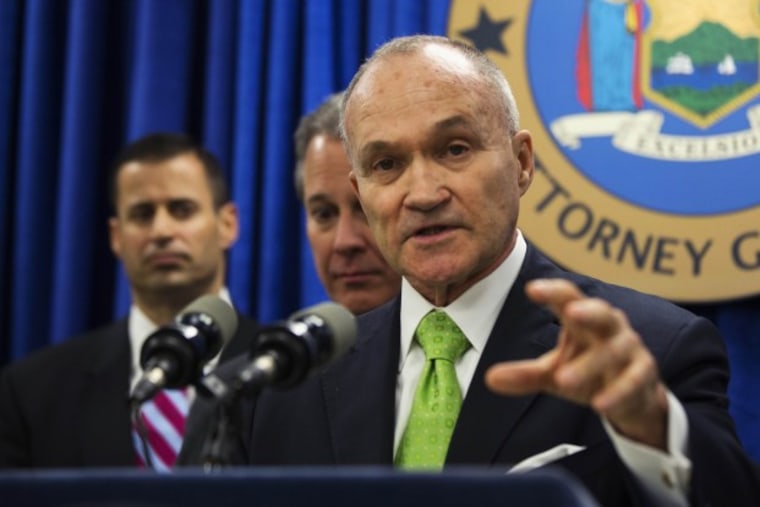Ray Kelly says if his department is guilty of anything, it’s saving lives—7,383 lives to be exact. In the 11 years since Kelly became New York City’s Police Commissioner, there have been 7,383 fewer deaths than the 11 years before Kelly took over, he said Tuesday.
Key to that drop in crime, Kelly says, is stop-and-frisk, New York’s much-criticized program that allows police to stop and question anyone if they suspect wrongdoing. Critics say the program is institutionalized racial profiling and point to the disproportionate number of stops that affect minorities.
“It’s a practice that’s essential,” Kelly said on Tuesday’s Morning Joe. “You can’t police without doing it.”
As a federal court nears a decision over the legality of stop-and-frisk, Kelly is defending the policy at the center of his legacy. In a Wall Street Journal editorial "NYPD: Guilty of Saving 7,383 Lives," Kelly argued his critics were ignoring reality.
“As a city, we have to face the reality that New York's minority communities experience a disproportionate share of violent crime. To ignore that fact, as our critics would have us do, would be a form of discrimination in itself,” he wrote.
On Tuesday’s Morning Joe, Kelly said the negative press, lawsuits, and media attention had “overblown” the practice.
“It’s a component, but people want to make it out as a program. It’s not a program. It’s a practice that’s essential,” he said. “It’s made a difference throughout New York.”
Kelly’s name has been floated to replace Janet Napolitano, who is stepping down as secretary of Homeland Security; the president has said he’d consider Kelly’s name. Asked about the nomination, Kelly responded: “I’m flattered by the comments coming from the president, but I’m not making any other comments.”
Critics of the program say stop-and-frisk breeds resentment and distrust within minority communities, but Kelly said “proactive engagement”—or stopping and questioning citizens before any crime has been committed—was a “core function of law enforcement throughout America.”
He pushed back against co-host Mika Brzezinski's claim that many who are stop and frisked are not doing anything wrong, saying that police presence prevents crime.
"They need reasonable suspicion to stop and question someone," Kelly said. "The notion that anyone stopped has done absolutely nothing wrong is not really the case."
He also rejected claims that officers have stop-and-frisk quotas to fill, pushing them to needlessly stop citizens.
“There are no quotas. There are productivity goals,” he said.
He also said the department’s record keeping had dramatically improved over the years, which made the numbers of stop-and-frisk look more dramatic.
“We’re being criticized to a certain extent for accurate record keeping,” he said. “Those numbers amount to less than one stop per week per officer.”
But as New York City Mayoral candidate Christine Quinn mentioned on Morning Joe earlier this month, the number of police stops is down 50%, but homicides are at a sixty-year low.
“We’ve had, at its peak, 700,000 stops. Single digits of those lead to arrests or guns or any significant contraband. Clearly that was not being done in a constitutionally sound way,” she said. “The facts have shown that you do not need stops at that level to keep the city safe,” Quinn said.
The NYPD has attributed the drop in crime to anti-gang initiatives and well-staffing high-risk areas.
Watch the full interview.
